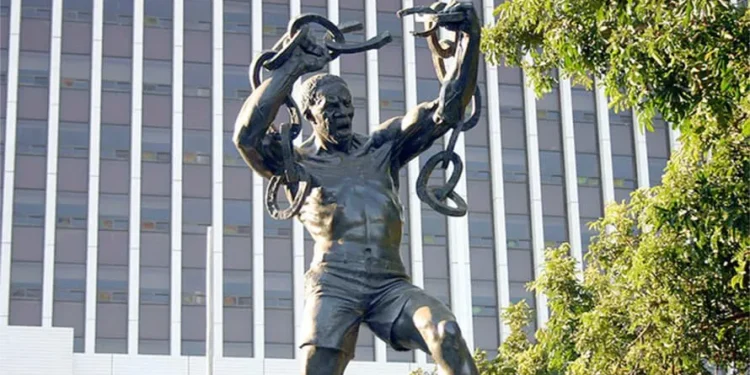Has Africa Freedom Day lost its meaning?
By Hicks Sikazwe
MAYBE we need to review and redefine events that mark the annual Africa Freedom Day or Africa Day commemoration that runs every 25th of May.
For sometime now the celebrations are heralded by the release of prisoners, a march past at the Freedom Statue in Lusaka before stunned members of the diplomatic corps, some of whom do not even know why they even lay wreaths for the occasion.
But then what is the significance of this day and what are its origins? The story goes back to April 15, 1958 when countries which met for the first time at the first Congress of African States held in the Ghanian capital, Accra.
The gathering was put together by Prime Minister Kwame Nkrumah, whose country just previously attained independence, getting out of the colonial york. Representatives at the gathering included those from Egypt, Ethiopia, Liberia, Libya Morroco, Sudan, Tuniasia and Cameroun.
The Accra meeting was the precursor of the founding of the Organisation of African Unity (OAU) now African Union (AU) in 1963 at a summit hosted by Ethiopia’s Emperor Haile Selassie and on the date of May 25 the Africa Freedom Day sometimes referred to as Liberaton was also born.
According to euronews.com, the 1958 summit in Ghana was called the Congress of African States.
“During this pioneering conference, African leaders proposed an African day laying the foundation for what would later become a continental tradition. The high point came on 25 May, 1963 when the Organisation of African Unity (OAU) later transformed into today’s African Union was born.”
Further historical accounts note that immediately the OAU was formed the focus was to encourage decolonistion in Angola, Mozambique, South Africa and Southern Rhodesia, now Zimbabwe. But as it turned out to be the mandate spread to the rest of the continent.
Thus Africa Day or African Freedom Day commemorates the founding of the OAU on May 25, 1963. It also honours the liberation movements of the continent with a view to establish the United States of Africa.
Sixty-two years later today how much has been achieved? With many African countries having shaken off colonialism, what other relevancy wraps around the commemoration? If locally the key event is to release prisoners who are not even freedom fighters, what then is the country achieving?
Since the return to democracy in 1991, there seems to be a deliberate shift to ignore much of the narrative that shaped Zambia’s independence after the freedom struggle. It appears politics took centre stage after the United National Independence Party (UNIP) was removed.
In many cases even the bulk of those that get honoured are not anywhere close to the liberation struggle or its semblance. It is feared that the day will eventually become an event to recognise partisan individuals and cadres.
Even after so many years of independence there should be so many people who contributed to the struggle against colonialism. There simply have not been enough efforts to track such people and build a data base on them.
Hunting down such people, they do not need to have been in political leadership, would have helped to build a reservoir of senior citizens to consult on a number of issues that have confronted the country after 1990.
While freedom fighters of that time were selfless individuals who put the country first there is so much greed, self-centredness and individualism in the leaders of this day. For example, the totem for the country after 1964 was to live as one hence the coining of One Zambia One Nation. It is not the case today when genres like tribalism have been criminalised. Totally unnecessary for a nation that has been built on love across the board and virtual oneness.
The birth of Africa Day also encouraged the complete delinking from economic pursuits in favour of indigenous focus that would promote local industries to benefit the people.
Before 1990 the previous government established firms which among other things promoted agriculture commerce, mining and manufacturing. The new political dispensation sold off the outlets to promote privatisation. Under the term colonisation Africa and Zambia are still economically dependent on the colonial masters or their surrogates. The economic policies have largely benefited outsiders that local people.
Whichever way one looks at this issue privatisation stripped Zambians of ownership of the mining industry and other allied sectors to an extent that much of the economy is today being controlled by foreign hands.
Even shops, brick making, welding and other activities that in normal circumstances should have been a fall back for Zambians either losing jobs from privatised companies or just retired can look to, are dominated by foreign operators.
Unemployment has hit the country where it hurts most and the victims are youths who are freedom fighters’ great grandchildren or great great grandchildren. The above situation is not only common in Zambia but prevalent across the continent.
With this argument hasn’t Africa veered off or lost the spirit and aspiration of those who pioneered the Africa Day with a dream to foster political and economic freedom?
Hicks Sikazwe is author of Zambia’s Fallback Presidents, Wasted Years and Voters in Shadows. He is former Deputy Editor-in-Chief of Times of Zambia, now Communications and Media Affairs Advocate based in Ndola. Comments: 0955/0966029611 or hpsikazwe@gmail.com

























